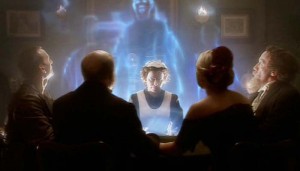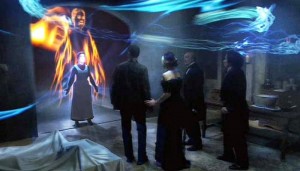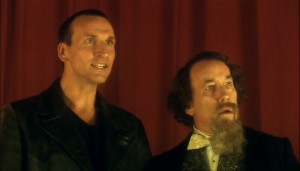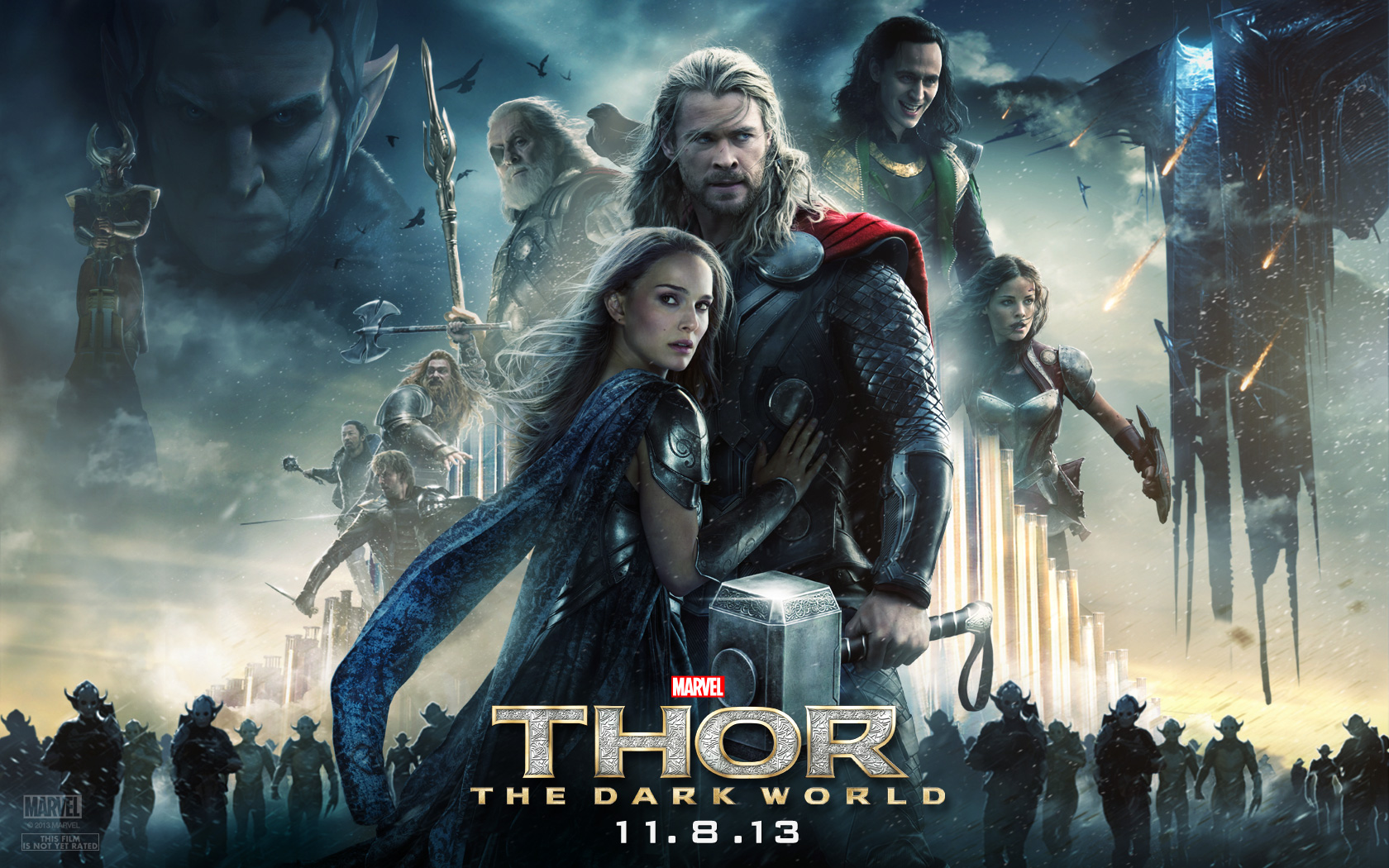“What the Shakespeare is going on?” This clever line is given to the actor playing Charles Dickens in this, the third episode of the Doctor Who reboot, written by Mark Gatiss (most recently of Sherlock Holmes fame). The TARDIS (as it often does, for it is increasingly revealed to be much more than a space ship) brings the Doctor and Rose to Victorian Cardiff at Christmastime, though they were aiming for quite a different time and place. In the course of things, a bewildered Charles Dickens becomes involved in the trouble they find themselves in—ghosts, this time. Or so it would seem.
 The dead are rising from the funeral parlor of Mr. Sneed and walking the streets. Using his clairvoyant servant Gwyneth, Sneed tracks the latest “escapee” to a Dickens’ dramatic reading. In a flurry of action, the Doctor and Rose are drawn to the same reading by the commotion caused by the undead patron; Rose catches Sneed and Gwyneth in the suspicious act of carting off the body and is kidnapped to keep her quiet; and Dickens (unwittingly, at first, until the Doctor gushes over his work) pairs up with the Doctor on a rescue mission for Rose. Soon united again at the funeral parlor, all three become involved in Sneed’s unfortunate “walking dead” problem.
The dead are rising from the funeral parlor of Mr. Sneed and walking the streets. Using his clairvoyant servant Gwyneth, Sneed tracks the latest “escapee” to a Dickens’ dramatic reading. In a flurry of action, the Doctor and Rose are drawn to the same reading by the commotion caused by the undead patron; Rose catches Sneed and Gwyneth in the suspicious act of carting off the body and is kidnapped to keep her quiet; and Dickens (unwittingly, at first, until the Doctor gushes over his work) pairs up with the Doctor on a rescue mission for Rose. Soon united again at the funeral parlor, all three become involved in Sneed’s unfortunate “walking dead” problem.
But things are never what they “seem,” especially when traveling with the Doctor. It turns out that the dead are not in fact waking up—they are being temporarily possessed by an alien race who are trapped in a rift without form or home world. When Gwyneth accesses their voice through a séance, they plead for a bridge to be created through Gwyneth so that they may enter Earth, moving into discarded human bodies to reclaim their lives.
Charles Dickens: “Incredible. Ghosts that are not ghosts, but beings from another world, who can only exist in our realm by inhabiting cadavers.”
The Doctor: “Good system. It might work.”
Rose Tyler: [about the Gelth] “You can’t let ’em run around inside of dead people!”
The Doctor: “Why not? It’s just like recycling.”
Rose Tyler: “Seriously though, you can’t.”
The Doctor: “Seriously though, I can!”
Rose is horrified. It is mentioned earlier in the episode that Rose Tyler lost her father at a young age. Surely it is him she thinks of as she vehemently protests allowing aliens to enter the body of those loved, lost, and mourned. She struggles to translate this newest idea into her current understanding of the world, never able to intelligently articulate why the Gelth should not be allowed into human corpses.
The Doctor: “It’s a different morality. Get used to it, or go home.”
On a much larger scale, Charles Dickens is also struggling to cope with the changing world and its new “rules.” In this episode, Dickens mirrors the character Ebenezer Scrooge from A Christmas Carol. At first, he is shown to be life-weary and despondent: his sense of meaning and hope in the world slipping away.
Charles Dickens: “On, on I go. Same old show. I’m like a ghost, condemned to repeat myself for all eternity.”
Stage Manager: “It’s never too late, sir. You could think up some new turns.”
Charles Dickens: “No, I can’t. Even my imagination grows stale. I’m an old man. Perhaps I’ve thought everything I’ll ever think.”
As he watches events unfold before him–not unlike those in his own fictional stories–he becomes quite frantic with fear in the possibility that all he has ever known or believed is wrong. After all, he has built his life and calculated his own value from these beliefs. Accepting a new Truth about the world poses a weighty threat and so, perhaps understandably, he chooses to deny the existence of ghosts, aliens, the Geth–calling it all “humbug,” though these things are before his very own eyes.
Charles Dickens: “Can it be that I have the world entirely wrong?”
The Doctor: “Not wrong. There’s just more to learn.”
Charles Dickens: “I’ve always railed against the fantasist. Oh, I loved an illusion as much as the next man, reveled in them. But that’s exactly what they were. Illusions. The real world is something else. I dedicated myself to that, injustices, the great social causes. I hoped that I was a force for good. Now, you tell me that the real world is a realm of specters and jack-o-lanterns. In which case, have I wasted my brief span here, Doctor? Has it all been for nothing?”
 I sympathize with Dickens as he faces this crisis of belief. Even if the evidence is mounting before us, and even if the old system of beliefs is crumbling beneath us, it is terrifying to accept a new Truth, when we have built so much on the old one. Truth worth believing in is one that is solid, secure. Something strong enough to tether our lives to that when new information or scenarios, new joys or pains, present themselves, though our lives may be shaken, they will not be lost or destroyed.
I sympathize with Dickens as he faces this crisis of belief. Even if the evidence is mounting before us, and even if the old system of beliefs is crumbling beneath us, it is terrifying to accept a new Truth, when we have built so much on the old one. Truth worth believing in is one that is solid, secure. Something strong enough to tether our lives to that when new information or scenarios, new joys or pains, present themselves, though our lives may be shaken, they will not be lost or destroyed.
The Bible asserts that it is such a Truth. Matthew 7:24-27 records these of Jesus’ words “Everyone then who hears these words of mine and does them will be like a wise man who built his house on the rock. And the rain fell, and the floods came, and the winds blew and beat on that house, but it did not fall, because it had been founded on the rock. And everyone who hears these words of mine and does not do them will be like a foolish man who built his house on the sand. And the rain fell, and the floods came, and the winds blew and beat against that house, and it fell, and great was the fall of it.”
Charles Dickens learns, as Rose did in episode 1, that there is something more out there than he previously understood–it is big and fantastical and requires a different response to life than the old way of thinking did. When Dickens is finally able to accept the Truth, it is he who ends up saving the Doctor and Rose from the Gelth, who are lying about their intentions with Earth. He rushes in, puts it all on the line, and uses his cleverness and his courage to save the day. And at the end of the episode, when all is well again, he finds himself feeling alive in the new possibilities of the world. He even says the iconic line “God bless us, everyone” as he jauntily goes back into a world that before, he was wearily traversing.



